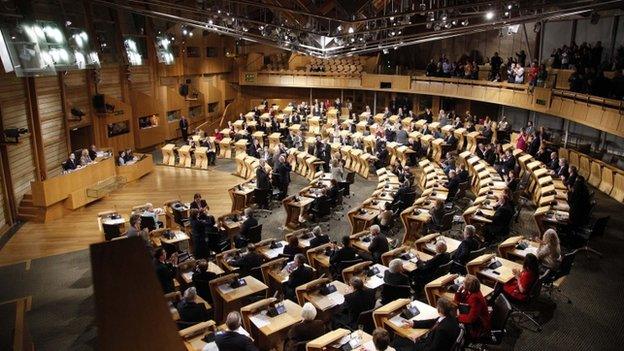Scottish Labour conference: Party delegates approve power plan
- Published

The Scottish Parliament already has a limited power to vary income tax but it has never been used
Scottish Labour plans to increase the financial powers of the Scottish Parliament have been unanimously endorsed at its party conference.
Delegates in Perth backed the proposals of a special devolution commission, external, despite some concerns over the way the process was handled.
The commission said Holyrood should be allowed to raise about 40% of its own revenues.
The plan came ahead of the 18 September Scottish independence referendum.
Scottish Labour leader Johann Lamont said a "No" vote in the referendum was a "a vote for change".
She told the conference: "We know that Scotland is a diverse country with diverse views, and therefore it is all the more offensive to us that some would write all of England off as if they believed in one political ideology.
"There are radical voices right across the UK who stand in unison with us for change and equality in our communities.
"We ask for a progressive tax varying ability, which I believe is in tune with the people of Scotland's priorities, a more flexible opportunity to ensure that those with the broadest shoulders in tough times perhaps take a little more of the burden."
The commission announced its final proposals following a two-year consideration of the issues and a robust debate within the party.
Hinting at some of those divisions, Labour MSP Ken Macintosh told the conference: "I offer my own three cheers for the devolution commission.
"That is not a line Johann expected to hear from me a couple of weeks back."
Criticism of politicians
More scathing was Kevin Lindsay, Scottish secretary of the union Aslef, who attacked the "audacity" of Labour politicians who criticised the commission in the media.
He told the conference: "I am going to be critical of some of our elected officials, namely our MPs and MSPs who think it's appropriate to run to the press to tell them what they think should be in the devo commission report, and have the audacity to try and lead the commission before it is published.
"That is wrong, it is us the foot soldiers and delegates at conference that decide what the Labour Party does."
The commission report said Holyrood should be able to raise about 40% of its own revenues, £2bn more than the most recent Scotland Act 2012, external.
When it comes into being in 2016, it will give the Scottish Parliament control over more tax raising powers in exchange for a 10p in the pound cut in the block grant, but Labour believes this should be extended to 15p - giving Scotland control of three quarters of the basic rate of income tax.
The commission also said the parliament should have the powers to increase the higher rates of income tax, giving it the ability to tax richer citizens more.
However, there would be safeguards to prevent Scotland launching a tax competition with Westminster by cutting top rates. Top rates may only be cut if all rates are cut, Ms Lamont said.
Labour has not proposed to devolve corporation tax, national insurance, VAT, capital gains tax or air passenger duty.
The people of Scotland go to the polls on Thursday, 18 September, when they will be asked the "Yes/No" question: "Should Scotland be an independent country?"